The demand for cake boxes in Japan is expected to grow from USD 24.5 million in 2025 to USD 34.1 million by 2035, reflecting a compound annual growth rate (CAGR) of 3.4%. Cake boxes are widely used in the packaging of baked goods, particularly cakes, due to their ability to protect the product during transportation while maintaining its appearance. As consumer demand for high-quality, visually appealing, and convenient cake products continues to rise, the need for innovative and durable packaging solutions will also grow. Furthermore, the increasing trend of celebrating occasions with custom cakes and desserts is driving demand for packaging that ensures both safety and aesthetic appeal.
The packaging industry is also seeing a shift toward more sustainable solutions, which is likely to drive innovation in cake box materials. With growing consumer concern about environmental impact, manufacturers will continue to develop eco-friendly, recyclable, or biodegradable packaging options to meet the demand for sustainability. As the food and beverage sector, particularly the bakery segment, continues to expand, the demand for cake boxes is expected to follow suit, with increasing adoption of packaging that combines functionality, design, and sustainability.
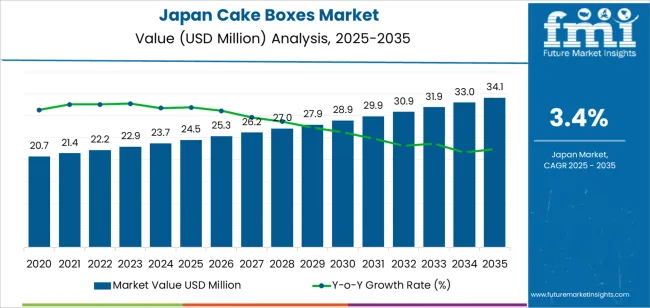
Between 2025 and 2030, the demand for cake boxes in Japan will increase from USD 24.5 million to USD 25.3 million. This steady growth will be driven by the rising popularity of cakes for special occasions, such as birthdays, weddings, and corporate events, along with the expansion of the bakery industry. The continued shift toward high-quality, custom cakes will further contribute to the demand for aesthetically pleasing and functional packaging.
From 2030 to 2035, demand for cake boxes is expected to increase from USD 25.3 million to USD 34.1 million. This phase will see stronger growth due to the rising demand for cakes and bakery products, especially with the ongoing trend of premium and personalized cakes. As more bakeries and cake shops focus on offering premium products, the need for packaging that reflects the quality of the product will drive the industry. The increasing preference for sustainable packaging options will accelerate the growth of the cake box industry, as manufacturers adopt eco-friendly materials to meet consumer preferences and regulatory requirements. The growth in this period reflects a more pronounced shift towards premiumization and sustainability in cake packaging.
| Metric | Value |
|---|---|
| Demand for Vascular Access Catheters in Japan Value (2025) | USD 169.3 billion |
| Demand for Vascular Access Catheters in Japan Forecast Value (2035) | USD 257.3 billion |
| Demand for Vascular Access Catheters in Japan Forecast CAGR (2025 to 2035) | 4.3% |
The demand for vascular access catheters in Japan is on the rise as healthcare providers address the increasing need for prolonged intravenous therapies. These catheters are critical in treatments such as chemotherapy, parenteral nutrition, and complex infusion regimens, particularly in light of an aging population and rising incidence of chronic illnesses. Healthcare facilities are focusing more on devices that enable extended access with fewer insertions, thus enhancing patient comfort and reducing procedural risks.
Technological advances are further supporting the uptake of these devices. Modern catheters feature improvements such as antimicrobial surfaces, refined wall construction for better flow dynamics, and enhanced securement systems. These developments contribute to fewer complications like infection or thrombosis, making the devices more appealing to clinicians and hospital administrators. In addition, catheter designs that facilitate outpatient or home‑based care are gaining preference as treatment models evolve beyond traditional inpatient settings.
The transition in Japan’s healthcare delivery toward ambulatory and home care also plays a significant role. As more treatments move out of conventional hospital settings, the requirement for reliable, long‑term vascular access devices become more pronounced. Catheters designed for durability, convenience, and minimal disruption align well with evolving patient care pathways. With these factors in play, the demand for vascular access catheters in Japan is expected to grow steadily through 2035.
Demand for cake boxes in Japan is segmented by material, end-user, size, and printing. By material, demand is divided into paper & paperboard boxes, plastic boxes, and biodegradable material. The demand is also segmented by end-user, including bakeries and confectioneries, hotels and restaurants, event planners (weddings, birthdays, etc.), and retailers. In terms of size, demand is divided into less than 5 oz., 5 oz. to 10 oz., and above 10 oz., with less than 5 oz. Regarding printing, demand is segmented into offset printing, flexographic printing, digital printing, and screen printing, with offset printing leading the demand. Regionally, demand is divided into Kanto, Kinki, Chubu, Kyushu & Okinawa, Tohoku, and the Rest of Japan.

Paper & paperboard boxes account for 50% of the demand for cake boxes in Japan. These materials are favored for their versatility, ability to provide protection to delicate cakes, and eco-friendly properties. Paper and paperboard boxes are widely used in the food industry for packaging baked goods, as they can be easily customized with branding, colors, and designs, providing a premium presentation for cakes and pastries.
These boxes are lightweight, cost-effective, and biodegradable, appealing to environmentally conscious consumers. As sustainability becomes a more prominent factor in packaging choices, paper and paperboard boxes are expected to remain a dominant choice for cake packaging in Japan. With increasing consumer awareness around environmental issues, the shift toward recyclable and compostable materials is likely to further solidify the demand for paper and paperboard boxes in the cake packaging industry.
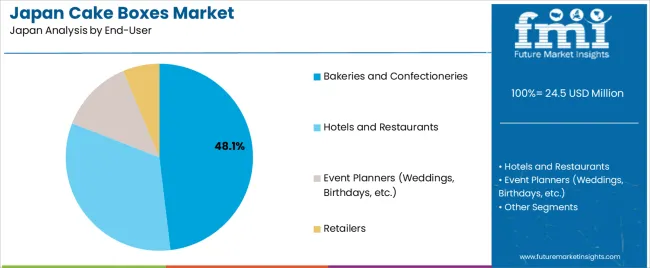
Bakeries and confectioneries account for 48% of the demand for cake boxes in Japan. These establishments rely heavily on cake boxes to safely package cakes, pastries, and other baked goods for sale or delivery. Cake boxes are essential for maintaining the quality, presentation, and freshness of baked products, ensuring they reach customers in perfect condition. With the rising trend of custom cakes for special events such as weddings and birthdays, bakeries and confectioneries require packaging that not only protects the product but also adds aesthetic value.
The growing popularity of artisanal and customized cakes, along with increasing demand for packaged treats, drives the continued dominance of bakeries and confectioneries as the largest end-user segment for cake boxes. As the demand for high-quality, attractive cake packaging continues to rise, bakeries and confectioneries will remain the primary consumers of cake boxes in Japan.
Key drivers include increasing consumption of premium and custom‑cakes for celebrations, rising online ordering and home‑delivery of baked goods which demand packaging that protects and presents the product, and growing interest in sustainable, visually appealing packaging among Japanese consumers and bakeries. Restraints include cost pressures for smaller bakeries to upgrade packaging, limited floor‑space or storage constraints in urban production facilities which may limit packaging innovation, and competition from simpler or unbranded packaging formats when margin is tight.
In Japan, demand for cake boxes is growing because bakeries and confectionery producers are responding to consumer expectations for both quality and presentation cakes for birthdays, weddings and gifting occasions are more common. The rise of online cake delivery and direct‑to‑consumer models means packaging must not only look good but also withstand shipping and handling. Furthermore, growing interest in artisanal and seasonal cakes drives need for custom‑branded and distinctive boxes that enhance brand image and customer experience. As a result, packaging for cakes is becoming a strategic part of bakery business in Japan.
Technological innovations are influencing the cake‑box segment in Japan by improving materials, print customisation and packaging formats. For example, new paperboards and coatings designed for food‑safe applications allow better durability and print clarity. Digital printing makes it cost‑effective to produce small batches of custom‑designed boxes, which is ideal for boutique bakeries. Structural innovations such as fold‑flat or auto‑popup designs improve assembly and transportation efficiency for e‑commerce orders. Sustainability innovations, including compostable or recycled‑content boxes, align with Japanese consumer expectations. These advances make cake boxes more functional, visually attractive and aligned with modern bakery operational needs in Japan.
Despite growing interest, adoption of premium or custom cake‑boxes in Japan is limited by several challenges. One issue is upfront cost: specialised materials, custom printing and complex structural designs increase packaging cost, which may be difficult for smaller bakeries or low‑margin operations. Another challenge is logistics: urban bakeries often have limited storage or production space, making larger or more complex box inventories harder to manage. Supply‑chain risks (such as shortages of food‑approved board or printing capacity) can delay production. Finally, consumer price sensitivity means that packaging upgrades must not drive cake prices too high, which can limit how far bakeries are willing to invest in advanced box formats.
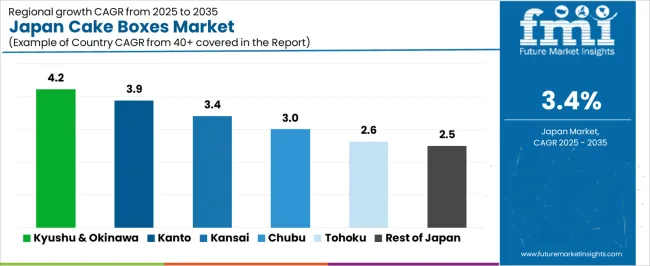
| Region | CAGR (%) |
|---|---|
| Kyushu & Okinawa | 4.2 |
| Kanto | 3.9 |
| Kinki | 3.4 |
| Chubu | 3.0 |
| Tohoku | 2.6 |
| Rest of Japan | 2.5 |
Demand for cake boxes in Japan is increasing across all regions, with Kyushu & Okinawa leading at a 4.2% CAGR. This growth is driven by the region’s expanding food and confectionery industries. Kanto follows with a 3.9% CAGR, supported by its large urban population and the growing demand for cakes and pastries for special occasions. Kinki shows a 3.4% CAGR, fueled by its strong bakery sector and retail industry. Chubu experiences a 3.0% CAGR, with demand driven by its growing bakery industry and increasing popularity of home delivery services. Tohoku sees a 2.6% CAGR, with steady demand driven by the region’s food sector. The Rest of Japan shows the lowest growth at 2.5%, but consistent demand remains due to regional bakery and food production needs.
Kyushu & Okinawa are experiencing the highest demand for cake boxes in Japan, with a 4.2% CAGR. This growth is largely driven by the region’s growing food and confectionery sectors, particularly in cities like Fukuoka, where there is a rising demand for packaged baked goods. The increasing popularity of cakes and pastries, especially for special occasions, has contributed to the demand for cake boxes. The region’s expanding retail and e-commerce sectors are supporting the demand for packaged baked goods.
The need for high-quality, aesthetically appealing packaging that preserves the freshness of cakes and ensures safe delivery is driving the adoption of cake boxes. As Kyushu & Okinawa continue to see growth in their food processing and retail industries, the demand for cake boxes is expected to remain strong, supported by both traditional bakeries and online cake retailers offering diverse products.
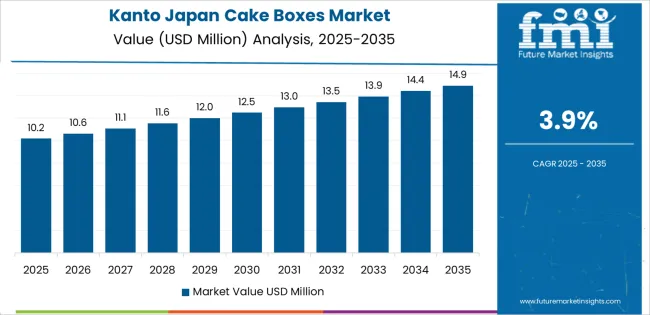
Kanto is experiencing steady demand for cake boxes in Japan, with a 3.9% CAGR. The region, which includes major cities like Tokyo and Yokohama, is a hub for the bakery and confectionery industries, with increasing consumer demand for packaged cakes and pastries. Kanto’s large population, coupled with a high number of special events and celebrations, is driving the demand for cake boxes, as they provide a convenient and safe packaging solution for baked goods.
The region’s focus on quality, convenience, and aesthetics in packaging is further contributing to this trend. As more consumers turn to online shopping for cakes and baked goods, the demand for cake boxes has increased, with e-commerce platforms driving packaging needs for home delivery services. Kanto’s expanding bakery sector and growing food delivery industry ensure that demand for cake boxes will continue to rise in the coming years.
Kinki is experiencing moderate demand for cake boxes in Japan, with a 3.4% CAGR. This growth is supported by the region’s well-established food and beverage industry, particularly in cities like Osaka and Kyoto. Kinki’s robust bakery sector, which includes both traditional bakeries and modern patisseries, is contributing to the increasing demand for cake boxes. As consumer demand for high-quality, freshly packaged cakes and pastries rises, cake boxes are essential for ensuring that these products maintain their appearance, freshness, and integrity during delivery and display.
Kinki’s strong retail industry, including department stores and online food retailers, supports the growing demand for cake boxes, particularly as more consumers opt for convenience and shop for cakes online. With a focus on improving product presentation and safety, the demand for cake boxes in Kinki is expected to remain strong as the region’s food processing and retail sectors continue to expand.

Chubu is experiencing moderate demand for cake boxes in Japan, with a 3.0% CAGR. The region’s food and beverage sector, especially in cities like Nagoya, is driving the demand for packaged baked goods, including cakes. As consumer preferences shift towards convenient, high-quality food products, cake boxes have become essential in maintaining product freshness and ensuring safe delivery. Chubu’s growing number of bakeries, patisseries, and dessert shops, combined with an increasing trend of online cake orders, is supporting the demand for cake boxes.
The region’s retail and food industries are evolving, with more bakeries offering home delivery services, creating an ongoing need for packaging solutions that protect cakes during transportation. As Chubu continues to focus on expanding its bakery sector and improving food delivery services, the demand for cake boxes is expected to grow steadily, contributing to the overall packaging industry in the region.
Tohoku is experiencing moderate demand for cake boxes in Japan, with a 2.6% CAGR. The region’s food processing and bakery industries, although smaller compared to other regions, are driving the demand for cake boxes as more consumers purchase cakes for special occasions and celebrations. Tohoku’s rising bakery sector and growing interest in packaged baked goods are contributing to this trend. As more consumers in Tohoku look for convenient and safe packaging for cakes, cake boxes are becoming an essential part of the industry.
The region’s focus on expanding its retail industry and improving food delivery services is supporting the adoption of cake boxes for home delivery. While the growth rate in Tohoku is slower than in other regions, steady demand remains as local bakeries and food producers continue to embrace packaging solutions that ensure the quality and presentation of their products.
The Rest of Japan is experiencing the lowest demand for cake boxes, with a 2.5% CAGR. Although the region does not have the same level of large-scale bakery and food industries as major centers like Kanto or Kyushu, there is still consistent demand for cake boxes in smaller, regional bakeries and food processors. As consumer preferences for cakes and baked goods continue to rise across Japan, the need for reliable and safe packaging solutions remains steady in the Rest of Japan.
Local bakeries, dessert shops, and small-scale food producers are increasingly adopting cake boxes to preserve product quality and offer attractive packaging for their customers. As the region’s retail sector expands and food delivery services increase, the demand for cake boxes is expected to continue growing, though at a slower pace compared to other regions with larger food industries.
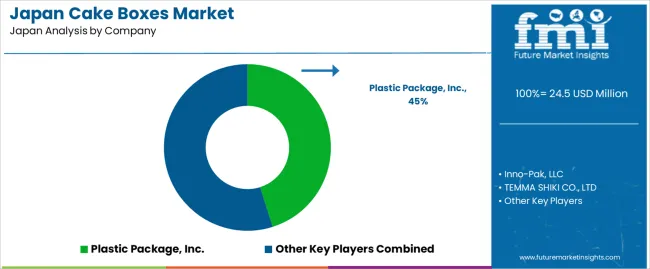
In Japan, demand for cake boxes is increasing significantly driven by a vibrant bakery and confectionery culture, frequent celebrations, and a growing preference for premium presentation. Packaging for cakes must not only protect the product but also enhance visual appeal, especially for occasions and gift‑giving. Domestic and international food container manufacturers are competing to meet this demand by offering high‑quality, decorative and functional cake box solutions.
Leading manufacturers in this space include Plastic Package, Inc. with a 45.1% share, Inno‑Pak, LLC, TEMMA SHIKI CO., LTD, LINDAR Corporation and Napco National. Plastic Package stands out through its manufacturing scale in Japan, diversified material options (including clear plastics and printed paperboard), strong brand relationships with bakeries and patisseries, and ability to deliver customised printing and rapid turn‑around. The other firms differentiate by offering specialty formats, niche designs (for boutique bakeries), or cost‑efficient models for mass retail channels.
Competitive dynamics are shaped by several forces. First, the growth of e‑commerce for bakery goods and home dessert delivery raises demand for packaging with safe transport, good presentation and shelf appeal. Second, consumer expectations for customized, aesthetic packaging (for example windowed boxes, ribbon finishes, branded prints) push suppliers to innovate in design and materials. Third, while premium designs are gaining, cost pressures remain significant bakeries seek value, especially in high‑volume retail.
Smaller or emerging suppliers face hurdles such as tooling cost, meeting hygiene & food‑grade standards, and competing against the scale and brand‑pull of major players. Companies that can combine high‑quality materials, rapid customisation, strong logistics and good design support are best positioned to succeed in Japan’s cake box environment.
| Items | Values |
|---|---|
| Quantitative Units (2025) | USD billion |
| Material | Paper & Paperboard Boxes, Plastic Boxes, Biodegradable Materials |
| Size | Less than 5 oz., 5 oz. to 10 oz., Above 10 oz. |
| Printing | Offset Printing, Flexographic Printing, Digital Printing, Screen Printing |
| End-User | Bakeries and Confectioneries, Hotels and Restaurants, Event Planners (Weddings, Birthdays, etc.), Retailers |
| Region | Kyushu & Okinawa, Kanto, Kinki, Chubu, Tohoku, Rest of Japan |
| Countries Covered | Japan |
| Key Companies Profiled | Plastic Package, Inc., Inno-Pak, LLC, TEMMA SHIKI CO., LTD, LINDAR Corporation, Napco National |
| Additional Attributes | Dollar sales by material type and size; regional CAGR and adoption trends; demand trends in cake boxes; growth in bakeries, confectioneries, and event planning industries; technology adoption for printing and packaging; vendor offerings including packaging materials, design services, and integration solutions; regulatory influences and industry standards |
The demand for cake boxes in japan is estimated to be valued at USD 24.5 million in 2025.
The market size for the cake boxes in japan is projected to reach USD 34.1 million by 2035.
The demand for cake boxes in japan is expected to grow at a 3.4% CAGR between 2025 and 2035.
The key product types in cake boxes in japan are paper & paperboard boxes, plastic boxes and biodegradable materials.
In terms of size, less than 5 oz. segment is expected to command 32.2% share in the cake boxes in japan in 2025.






Our Research Products

The "Full Research Suite" delivers actionable market intel, deep dives on markets or technologies, so clients act faster, cut risk, and unlock growth.

The Leaderboard benchmarks and ranks top vendors, classifying them as Established Leaders, Leading Challengers, or Disruptors & Challengers.

Locates where complements amplify value and substitutes erode it, forecasting net impact by horizon

We deliver granular, decision-grade intel: market sizing, 5-year forecasts, pricing, adoption, usage, revenue, and operational KPIs—plus competitor tracking, regulation, and value chains—across 60 countries broadly.

Spot the shifts before they hit your P&L. We track inflection points, adoption curves, pricing moves, and ecosystem plays to show where demand is heading, why it is changing, and what to do next across high-growth markets and disruptive tech

Real-time reads of user behavior. We track shifting priorities, perceptions of today’s and next-gen services, and provider experience, then pace how fast tech moves from trial to adoption, blending buyer, consumer, and channel inputs with social signals (#WhySwitch, #UX).

Partner with our analyst team to build a custom report designed around your business priorities. From analysing market trends to assessing competitors or crafting bespoke datasets, we tailor insights to your needs.
Supplier Intelligence
Discovery & Profiling
Capacity & Footprint
Performance & Risk
Compliance & Governance
Commercial Readiness
Who Supplies Whom
Scorecards & Shortlists
Playbooks & Docs
Category Intelligence
Definition & Scope
Demand & Use Cases
Cost Drivers
Market Structure
Supply Chain Map
Trade & Policy
Operating Norms
Deliverables
Buyer Intelligence
Account Basics
Spend & Scope
Procurement Model
Vendor Requirements
Terms & Policies
Entry Strategy
Pain Points & Triggers
Outputs
Pricing Analysis
Benchmarks
Trends
Should-Cost
Indexation
Landed Cost
Commercial Terms
Deliverables
Brand Analysis
Positioning & Value Prop
Share & Presence
Customer Evidence
Go-to-Market
Digital & Reputation
Compliance & Trust
KPIs & Gaps
Outputs
Full Research Suite comprises of:
Market outlook & trends analysis
Interviews & case studies
Strategic recommendations
Vendor profiles & capabilities analysis
5-year forecasts
8 regions and 60+ country-level data splits
Market segment data splits
12 months of continuous data updates
DELIVERED AS:
PDF EXCEL ONLINE
Cake Boxes Market from 2025 to 2035
Demand for Foldable Plastic Pallet Boxes in Japan Size and Share Forecast Outlook 2025 to 2035
Japan Faith-based Tourism Market Size and Share Forecast Outlook 2025 to 2035
Japan Sports Tourism Market Size and Share Forecast Outlook 2025 to 2035
Japan Respiratory Inhaler Devices Market Size and Share Forecast Outlook 2025 to 2035
Japan Halal Tourism Market Size and Share Forecast Outlook 2025 to 2035
Japan Automated People Mover Industry Size and Share Forecast Outlook 2025 to 2035
Japan Automotive Load Floor Industry Analysis Size and Share Forecast Outlook 2025 to 2035
Japan Food Cling Film Market Size and Share Forecast Outlook 2025 to 2035
Japan Polypropylene Packaging Films Market Size and Share Forecast Outlook 2025 to 2035
Cake Enzyme Market Size and Share Forecast Outlook 2025 to 2035
Cake Base Discs Market Size and Share Forecast Outlook 2025 to 2035
Japan Probiotic Yogurt Market is segmented by product type, source type, nature type, flavor type, fat content, sales channel and key city/province through 2025 to 2035.
japan Tortilla Market - Growth, Trends and Forecast from 2025 to 2035
Japan Cosmetics ODM Market Analysis - Size, Share & Trends 2025 to 2035
Japan Automotive Turbocharger Market Insights – Demand, Size & Industry Trends 2025–2035
Japan Yeast Market Insights – Demand, Size & Industry Trends 2025–2035
Japan Green and Bio-based Polyol Market Insights – Demand, Size & Industry Trends 2025–2035
Japan Natural Food Color Market Trends – Growth, Demand & Forecast 2025–2035
Japan Coated Fabrics Market Growth – Trends, Demand & Innovations 2025–2035

Thank you!
You will receive an email from our Business Development Manager. Please be sure to check your SPAM/JUNK folder too.
Chat With
MaRIA